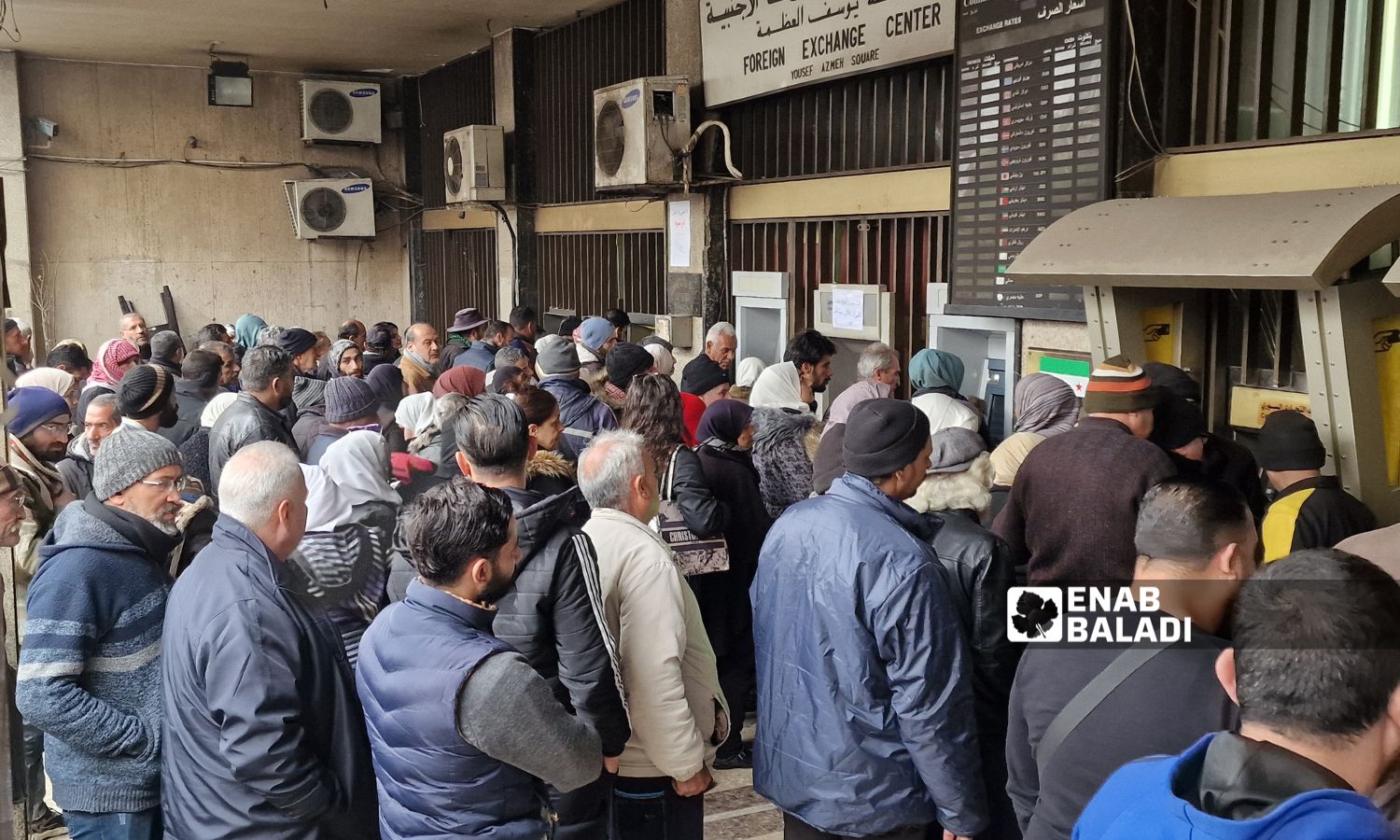



Enab Baladi – Jana al-Issa
On January 7, a US official and diplomat stated that Qatar plans to help fund a “massive” increase in public sector wages that the new Syrian government has promised, which in turn decided to raise salaries for employees by 400% starting next February.
Reuters news agency reported at the time that an Arab official said discussions about Qatar financing the salaries of the Syrian government were ongoing and that nothing had been finalized yet, adding that other countries, including Saudi Arabia, may join these efforts.
The US official said Doha was strongly pushing Washington for a sanctions waiver so that it could provide funding formally.
On January 5, the Syrian government announced a 400% salary increase for public sector employees, according to Syria’s acting Finance Minister, Mohammad Abazid.
The cost of the increase is estimated at around 1.65 trillion Syrian pounds, or about $127 million, and will be funded from the state’s current resources, along with a mix of regional aid and new investments and efforts to release frozen Syrian assets abroad, according to the minister.
There are more than 1.25 million employees on the public sector payroll in Syria, and a source in the Syrian Ministry of Finance told Reuters that they do not have confirmation regarding foreign funding for salaries, but there were general commitments for support.
In contrast, the governor of the Syrian Central Bank, Maysaa Sabrine, stated that the bank has enough money in its coffers to pay employees’ salaries even after the promised 400% increase by the new Syrian administration.
Sabrine did not provide details on Syria’s current foreign currency and gold reserves, stating that the review of the general budget is still ongoing.
The governor’s remarks came just weeks after statements from the head of the transitional government regarding reserves in Syria, in which he said that the central bank’s coffers only contain the Syrian pound “which is worthless,” adding in an interview with the Italian newspaper Corriere della Sera on December 11, 2024, “We have no foreign currency, and we are in a very bad financial situation.”
Regarding the impact of the Syrian government’s reliance on external funding for salaries and the new increase, researcher Abdul Azim al-Mugharbel believes that this could have negative effects on the economy, as it may increase the financial deficit once aid, which may only be temporary, ends.
Moreover, this reliance enhances dependency on foreign aid instead of developing sustainable local income sources. Additionally, this policy could lead to inflation in consumption spending without any accompanying improvement in economic productivity, putting extra pressure on the local economy, according to al-Mugharbel’s discussion with Enab Baladi.
Given the current data with respect to declining production and the breakdown of several sectors that could help revive the economic wheel in the country and subsequently lead to securing salaries from sustainable productive resources, the government needs to focus on several points at this stage, as indicated by al-Mugharbel.
Among these points are revitalizing the agricultural sector and small and medium-sized industries, along with encouraging small and medium enterprises in various sectors, improving financial governance, combating corruption to ensure efficient resource allocation, enhancing infrastructure to support production, and diversifying income sources, especially from state transit and port revenues.

Civilians in the streets of Damascus following al-Assad’s downfall – December 19, 2024 (Enab Baladi)
Economic expert George Khouzam considered that relying on external aid to fund increases in public sector salaries and frozen assets would have many negative effects on the economy. Among the most notable is the rise in the dollar exchange rate due to increased imports to meet the growing demand for imported goods, alongside a significant proportion of imported raw materials used in manufacturing national products.
This will also lead to price increases for all goods due to the increased demand compared to the quantity of goods available for sale, as Khouzam pointed out in a post on his official Facebook page.
Additionally, the private sector may be forced to increase salaries, leading to rising costs, and consequently higher prices, reduced exports, increased imports, decreased production, and increased unemployment, resulting in economic stagnation. Based on this, the salary increase would be illusory and negative, according to the economist.
Khouzam further added that conversely, if the funding for increasing public sector salaries comes from taxes based on increased production in both the public and private sectors, there will be no increase in prices or the dollar exchange rate. This situation would result in sufficient production increases to create a balance between the quantity of goods and the dollar available for sale in the market compared to the amount of money circulating in Syrian pounds. Accordingly, this increase would be genuine rather than illusory or negative.
The previous regime’s government funded salary increases enacted in recent years through two primary means: the first was savings from reducing subsidies on essential goods, and the second was through deficit financing, according to political economy researcher Yahya al-Sayed Omar in a previous opinion article.
Both previous methods used to secure the cost of salary increases are incorrect and led to extremely negative results for the Syrian people. When cutting subsidies on essential goods, family expenses increase, barely covering the new expenses.
As for deficit financing, it involves pumping more Syrian pounds into the market without productive backing. This increases inflation rates and exacerbates the pound’s crisis, thus deteriorating the purchasing power of wages, with the damage experienced by employees overshadowing the benefits gained from the increase.
if you think the article contain wrong information or you have additional details Send Correction